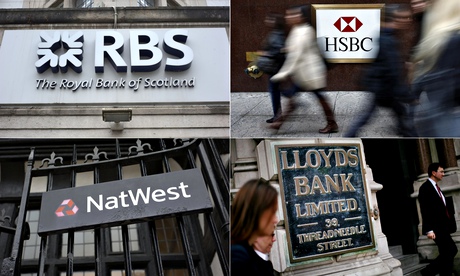Threatening legal letters from what appear to be solicitor firms are actually coming from a department of Lloyds or NatWest

High street banks use in-house solictors to send letters to struggling customers who may believe the letters were sent by a third party.
Britain's high-street banks are routinely issuing legal demands from what appear to be independent firms of solicitors designed to make struggling borrowers pay up. Yet the firms are not regulated by the legal profession's watchdog, and are simply names used by banks' in-house lawyers.
Royal Bank of Scotland and its NatWest arm have been using Green & Co Solicitors in Telford; Lloyds Bank uses SCM Solicitors in Hove, East Sussex, and, until January this year, HSBC used DG Solicitors in Edgbaston, Birmingham.
But a search of the register run by the Solicitors Regulation Authority (SRA) reveals that none exist as an entity supervised by the regulator.
The practice is legal because the letters are signed by a lawyer who is individually regulated by the SRA. Yet they give the impression to borrowers that their case has been escalated to a third party, using legal language such as "We are instructed by our client" and "We are likely to be instructed to commence court proceedings". The letter heading is near-identical, too, to that of an independent firm of solicitors, and typically uses a different address from that of the bank concerned.
Critics claim that the letters can be confusing and a scare tactic designed to harass people into paying up. But the good news for consumers is that since Guardian Money and others began probing the issue, the SRA has revealed that it will soon issue guidance after receiving a number of complaints that had given it "cause for concern".
And on Thursday, RBS disclosed that after a review of the letters it sends, it was stopping the use of any solicitor or debt-collection brand names that "could cause confusion".
The banks use a form of wording in the small print of the demands that identifies the solicitor "firm" as a unit of the bank. RBS says Green & Co is the "practising name of solicitors employed by the Royal Bank of Scotland Group", while Lloyds says SCM is "part of the in-house litigation department of Lloyds Banking Group".
Some will be surprised to learn that a company can explicitly use the word "solicitors" in its name and yet not be regulated as a firm by the SRA.
The SRA said that SCM Solicitors, for example, ceased trading as an independent regulated law firm in 2011, adding: "The firm is not a firm as an entity – it's just a trading name."
That, arguably, is a somewhat confusing distinction that may well be lost on the panicking recipients of the letters.
The tactics banks use to persuade people to pay up have come under the spotlight after the already notorious case of payday lender Wonga.
Last week it was ordered to pay £2.6m in compensation after it sent letters, to customers in arrears, from bogus law firms – such as Chainey D'Amato & Shannon – leading customers to believe that their outstanding debt had been passed to a law firm or another third party. There is no suggestion the banks are acting in the same way as Wonga. The crucial difference is that Wonga sent letters from fake lawyers, whereas the individuals signing the letters from the banks are authorised and regulated by the SRA.
But there is concern that, unless the people who receive the letters study the small print, they may feel duped into believing that their bank has escalated their case to a third-party firm, and that proceedings are imminent.
In a statement, Lloyds said: "Letters to our customers identify the qualified solicitor of record and make clear that SCM Solicitors forms part of Lloyds Banking Group's in-house litigation department." It pointed out that every letter sent out bore the name of a solicitor within the department who took responsibility for that letter. The correspondence also confirms the solicitor is authorised and regulated by the SRA, and gives that solicitor's registration number.
A spokesperson for RBS told Money: "Our customers should never be in any doubt about who they are communicating with. We have reviewed our policies in this area, and will stop the use of any solicitor or debt-collection brand names in correspondence with our customers that could cause confusion."
The bank said Green & Co had not taken any new business since 2012, and had only "a handful" of cases open, though it acknowledged that "we must make it clearer" to customers that it is an in-house RBS team.
It added that Green & Co "is a legitimately established law firm, registered with the Law Society, and its solicitors are regulated by the SRA".
HSBC said that in January this year it abandoned sending out legal warnings under the name of DG Solicitors and now just uses the HSBC brand.
"HSBC stopped using DG Solicitors in January 2014. All customer letters from DG Solicitors were compliant with the OFT debt recovery rules, and made clear that the firm was a trading name of HSBC and that its people were HSBC employees. To allow HSBC to be more flexible in how it works with customers in arrears, all legal correspondence to these customers is now under the HSBC brand."
A Guardian Money reader raised her concern about SCM Solicitors after it sent demands to her former tenant in Cambridge, saying that it had been instructed by its "client", Lloyds Bank, to demand he repay the outstanding debt on his current account. If payment was not received within 14 days, "legal proceedings may be issued against you", it continued.
The name of SCM Solicitors is prominently displayed in bold type at the top of the letter. In small type at the very bottom, it states that SCM Solicitors is part of Lloyds.
The woman contacted the SRA to find out more about the firm – only to be told that it had closed in June 2011.
The SRA says bank legal departments are able to operate under a trading name, even though the entity is not formally a legal firm in the sense of it having separate SRA regulation, professional indemnity and so on.
In an email to the bank, the Guardian Money reader said she was astonished that it could "apparently be permitted to use a non-existent firm of solicitors to mislead and intimidate its customers into action. I thought our ex-tenant was the bad guy – he's not bad, more hopeless. Lloyds Bank are not hopeless, and you have the capacity to fully understand and select the means by which you operate."
She added that the woman who signed the letter was a registered lawyer, "so for her to represent that she is a member of a solicitor's firm that is threatening legal action but which doesn't, in fact, exist, is rather odd".
In an email to the woman, a senior member of the banking group's legal department described the use of the name SCM Solicitors in letters as "a style for correspondence … the use of the style is one that has been reviewed and deemed appropriate by the SRA".
In a separate email, the woman in Lloyds' legal department who signed the letter appeared to indicate that she was not entirely happy with the way the SCM name was being used. She said she inherited the arrangement when she joined the bank, adding: "At my instigation ... the model is being actively reviewed."
In a statement to Money, Richard Collins, the SRA's executive director, says: "We can confirm we are currently looking into a number of complaints on this theme which have given us cause for concern. We will shortly be issuing guidance for in-house solicitors on our existing requirement that publicity must not be misleading. This will make it clear that they cannot use forms of words that give the impression they are an independent law firm and not employed solicitors."
The debt collectors that aren't what they seem
It's not just banks sending out demands made to look as if they are from a third party. Those from some utility companies and parking firms appear to be from a separate debt collection agency, when the "firm" has been invented as a way of pressurising people to pay up.
Typically, there's small print to the effect the debt recovery firm is a "trading name" of the bank/utility company.
This week the Student Loans Company (SLC) – a government-owned organisation – was found to have sent thousands of letters to graduates appearing to be from an independent debt agency, Smith Lawson & Company Recovery Services. Some began: "We are instructed by our client ..." In fact, Smith Lawson is a trading name of the SLC. On Tuesday, after an outcry, the SLC said it had "suspended all use of Smith Lawson-branded correspondence".
Meanwhile, many customers of Royal Bank of Scotland and NatWest have received letters from "Triton Credit Services", whose address is given as a post office box in Basildon, Essex. Some stated that Triton had been "instructed" by RBS/NatWest, though the small print said Triton was a trading name of the bank. This week RBS said it had decided to "phase out the use of the Triton brand", adding: "In future we will ensure it is much clearer to customers who they are communicating with."

